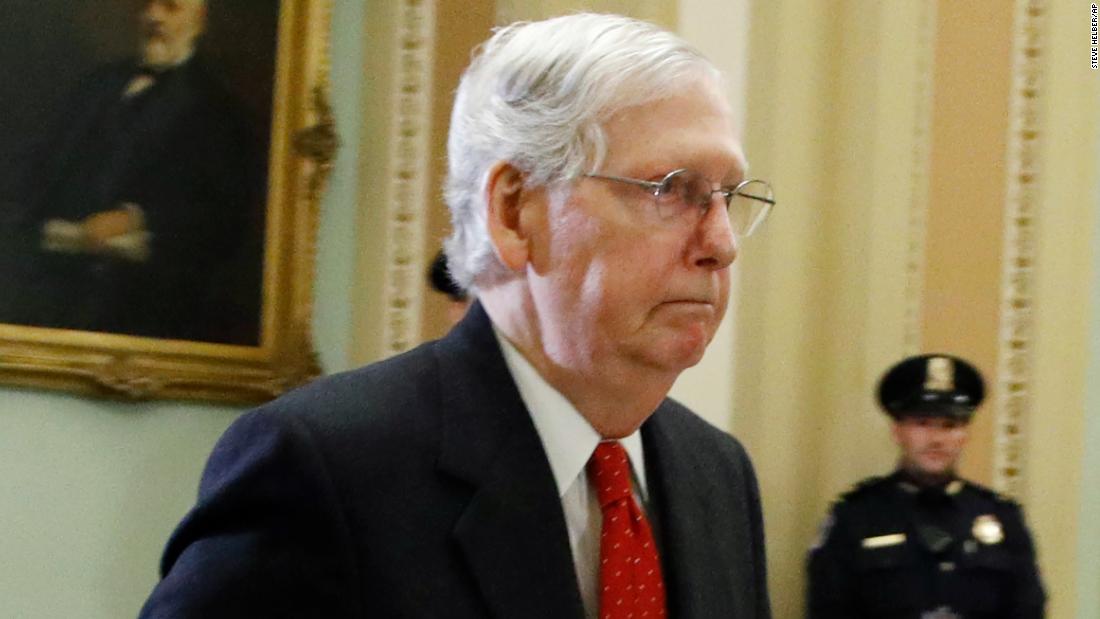[ad_1]
GOP leaders started to lay the groundwork internally to bring a rapid end to the trial if the witness vote is defeated on Friday, feeling out just how amenable the conference is to teeing up a vote to essentially close down the proceedings and move to a final vote on the articles of impeachment immediately after the witness vote, two GOP senators tell me. That means two things: they have grown confident in their count on the witness vote and this process could be over quite soon.
- Senate Democratic Leader Chuck Schumer holds a press conference at 11 a.m. ET.
- Senate closed-door party lunches at 11:30 a.m./12 p.m.
- Senate impeachment trial gavels into session at 1 p.m.
Could Trump be acquitted by Friday night?
It’s possible. Several Republican senators made that suggestion after it was discussed at the closed-door GOP lunch on Wednesday. But the reality is we just don’t know — and neither do they at this point. There are a lot of variables at play (do Democrats get a chance to offer motions that draw the process out? Are there closing arguments? Do senators decide to deliberate?)
So the short answer is, if the witness vote fails, Republican leaders are exploring how to vote to acquit Trump by Friday night. But there is every possibility it moves into Saturday or possibly later. Just stay tuned.
On the Q&A
The subtext of the entire day was the case for and against witnesses, and it’s likely to be the case again Thursday. But White House counsel being unable to answer specific questions about what the President knew or did regarding the Ukraine aide from Republican senators including Susan Collins of Maine, Lisa Murkowski of Alaska and Mitt Romney of Utah is notable.
The managers clearly not providing a response to Collins’ question regarding why bribery wasn’t included in the articles of impeachment that she deemed adequate was as well.
The GOP “yes” votes on witnesses
Collins.
Romney.
That’s it. It’s been virtually unchanged for days.
The shrinking GOP undecided votes on witnesses
Take a look at any list over the past few weeks or months, either printed here or elsewhere of the senators labeled “undecided” or “in play” to vote with Democrats to consider subpoenas for witnesses and documents. By Wednesday afternoon, almost all of those senators could be crossed off, firmly, or at least signaling, opposition to witnesses.
Sens. Bill Cassidy of Louisiana and Pat Toomey of Pennsylvania, neither of whom were ever firmly trending toward witnesses but who had raised the idea behind closed doors, appeared to pretty firmly close out the idea in public comments.
Sens. Cory Gardner of Colorado and Martha McSally of Arizona, two of the most vulnerable GOP senators, made it official they’d be voting against witnesses. (Though to be clear: neither had been on our lists for a few weeks. The political incentives for breaking with the President, according to several GOP campaign officials, were virtually non-existent.)
Sen. Rob Portman of Ohio is largely considered to be in line with leadership on this, according to sources, and he teed up a question for the President’s legal team to discuss the implications for the Senate if the chamber were to call witnesses.
Sen. Jerry Moran of Kansas never said he was considering voting for witnesses — he’s largely held off on commenting about the trial — but he’s often a wild card in these kinds of votes. He’s not a wild card this time around.
Who is left
Sen. Lamar Alexander of Tennessee. At this point, that really is about it, GOP senators and aides tell me. Alexander has largely kept to himself and kept his own counsel throughout the trial. He helped Collins and Murkowski with the witness language in the initial organizing resolution, but hasn’t committed to voting to move forward on witnesses. Sources familiar with Alexander caution against thinking he’s in any great hurry to ride in and be the deciding vote on it, particularly given his concern that much of the process is just an effort for Democrats to create political issues for Senate Republicans up in 2020.
Alexander is also extremely close with McConnell.
All of that said, to a person, GOP senators leave Alexander alone on decisions like this. He has immense respect inside the conference and has made clear he’ll make his mind up after the senator question and answer period ends.
Keep an eye on this
The backstory is this: Roberts signaled to senators earlier this week he would not read any questions that included the alleged whistleblowers name, or significant identifying information of the alleged individual.
Paul’s question included the name. He believes he has every right to ask it, and that Roberts has no grounds to block it. But the question ran afoul of Roberts communicated red line, and Paul was informed by GOP leadership he couldn’t ask.
He could be seen (and overheard) extremely frustrated on the Senate floor at one point.
It’s not over. There’s still a chance Paul could try and force his question Thursday which would be a remarkable — and very unprecedented — moment on the Senate floor.
[ad_2]
Source link




